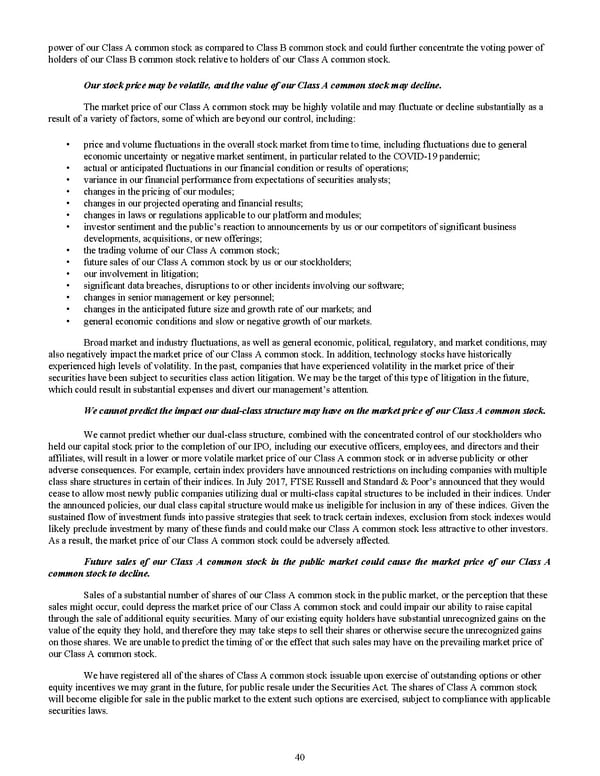power of our Class A common stock as compared to Class B common stock and could further concentrate the voting power of holders of our Class B common stock relative to holders of our Class A common stock. Our stock price may be volatile, and the value of our Class A common stock may decline. The market price of our Class A common stock may be highly volatile and may fluctuate or decline substantially as a result of a variety of factors, some of which are beyond our control, including: • price and volume fluctuations in the overall stock market from time to time, including fluctuations due to general economic uncertainty or negative market sentiment, in particular related to the COVID-19 pandemic; • actual or anticipated fluctuations in our financial condition or results of operations; • variance in our financial performance from expectations of securities analysts; • changes in the pricing of our modules; • changes in our projected operating and financial results; • changes in laws or regulations applicable to our platform and modules; • investor sentiment and the public’s reaction to announcements by us or our competitors of significant business developments , acquisitions, or new offerings; • the trading volume of our Class A common stock; • future sales of our Class A common stock by us or our stockholders; • our involvement in litigation; • significant data breaches, disruptions to or other incidents involving our software; • changes in senior management or key personnel; • changes in the anticipated future size and growth rate of our markets; and • general economic conditions and slow or negative growth of our markets. Broad market and industry fluctuations, as well as general economic, political, regulatory, and market conditions, may also negatively impact the market price of our Class A common stock. In addition, technology stocks have historically experienced high levels of volatility. In the past, companies that have experienced volatility in the market price of their securities have been subject to securities class action litigation. We may be the target of this type of litigation in the future, which could result in substantial expenses and divert our management’s attention. We cannot predict the impact our dual-class structure may have on the market price of our Class A common stock. We cannot predict whether our dual-class structure, combined with the concentrated control of our stockholders who held our capital stock prior to the completion of our IPO, including our executive officers, employees, and directors and their affiliates, will result in a lower or more volatile market price of our Class A common stock or in adverse publicity or other adverse consequences. For example, certain index providers have announced restrictions on including companies with multiple class share structures in certain of their indices. In July 2017, FTSE Russell and Standard & Poor’s announced that they would cease to allow most newly public companies utilizing dual or multi-class capital structures to be included in their indices. Under the announced policies, our dual class capital structure would make us ineligible for inclusion in any of these indices. Given the sustained flow of investment funds into passive strategies that seek to track certain indexes, exclusion from stock indexes would likely preclude investment by many of these funds and could make our Class A common stock less attractive to other investors. As a result, the market price of our Class A common stock could be adversely affected. Future sales of our Class A common stock in the public market could cause the market price of our Class A common stock to decline. Sales of a substantial number of shares of our Class A common stock in the public market, or the perception that these sales might occur, could depress the market price of our Class A common stock and could impair our ability to raise capital through the sale of additional equity securities. Many of our existing equity holders have substantial unrecognized gains on the value of the equity they hold, and therefore they may take steps to sell their shares or otherwise secure the unrecognized gains on those shares. We are unable to predict the timing of or the effect that such sales may have on the prevailing market price of our Class A common stock. We have registered all of the shares of Class A common stock issuable upon exercise of outstanding options or other equity incentives we may grant in the future, for public resale under the Securities Act. The shares of Class A common stock will become eligible for sale in the public market to the extent such options are exercised, subject to compliance with applicable securities laws. 40
 2022 10K Page 46 Page 48
2022 10K Page 46 Page 48